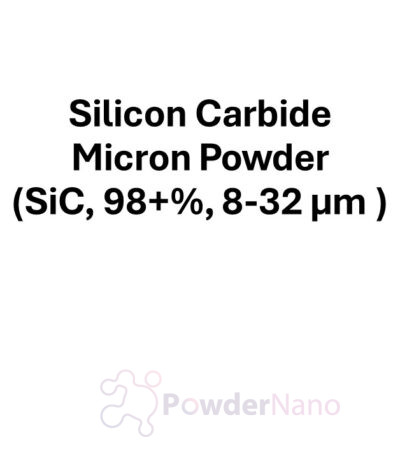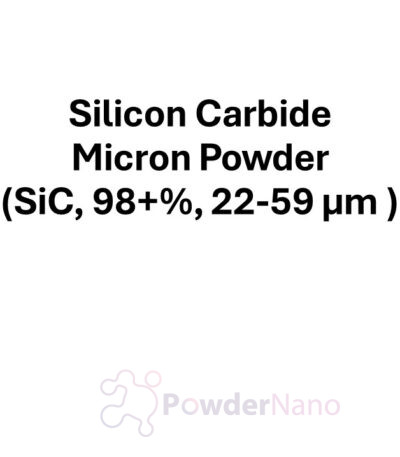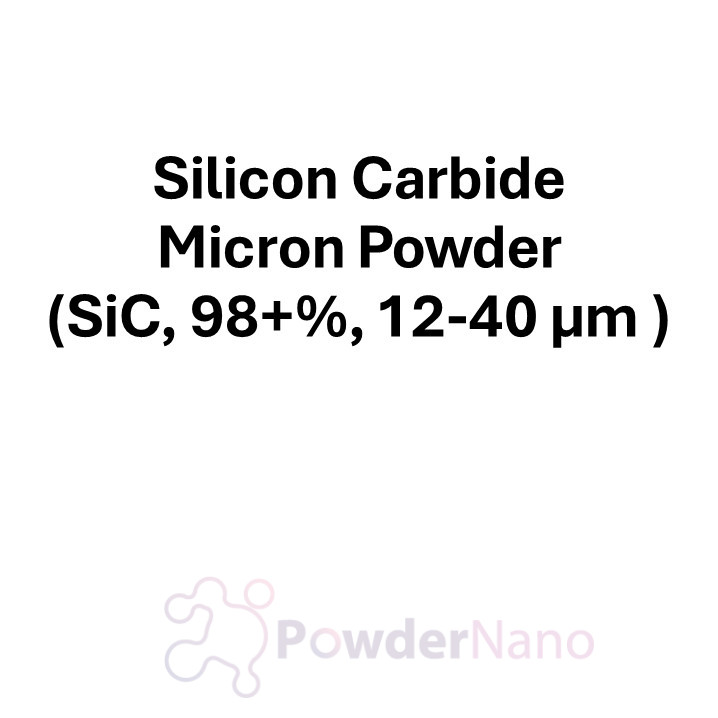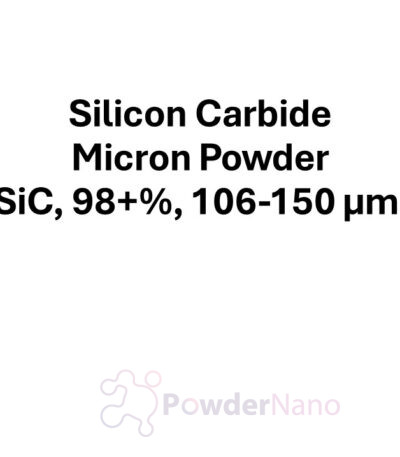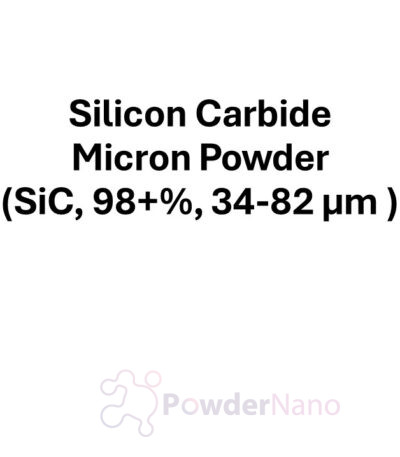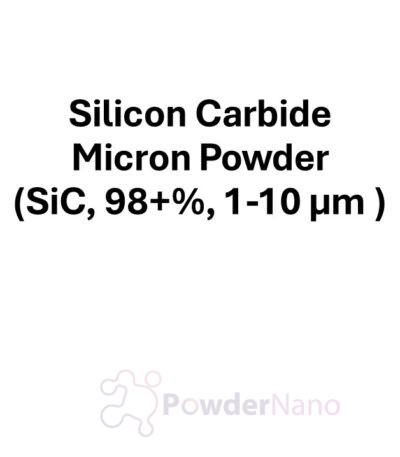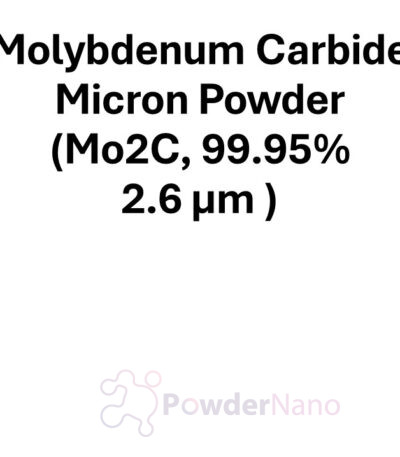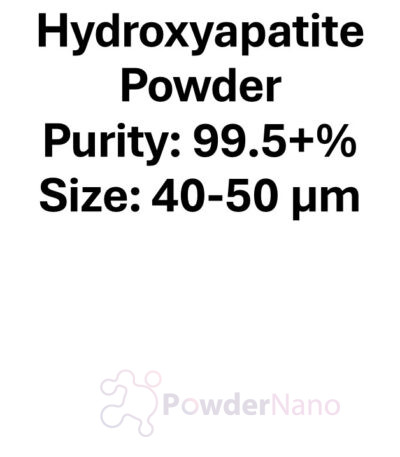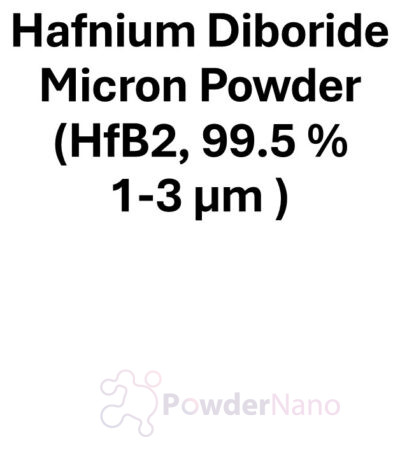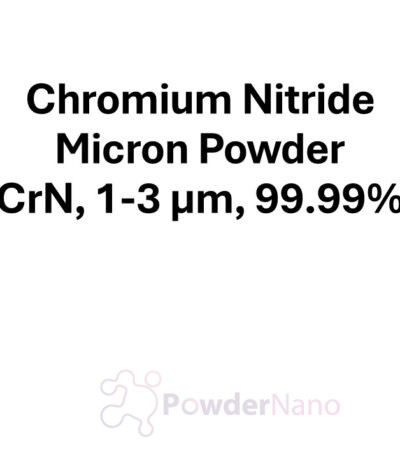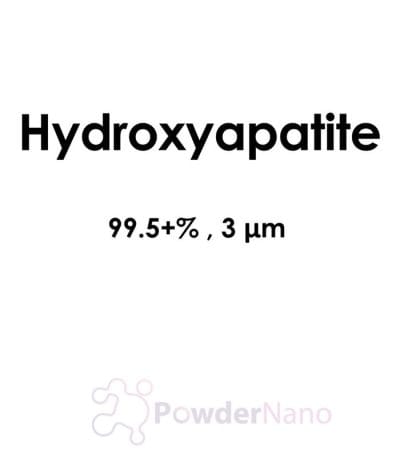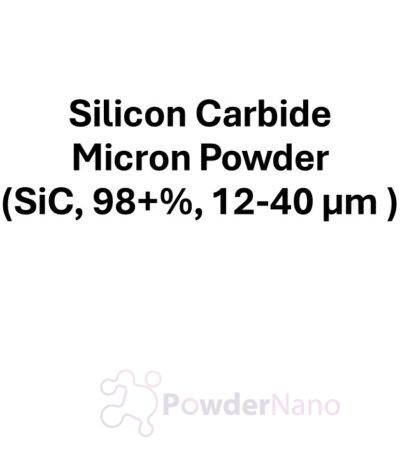Silicon Carbide Micron Powder (SiC, 98+%, 12-40 µm)
Technical Specifications:
- Material: Silicon Carbide (SiC)
- Purity: 98% or higher
- Particle Size: 12-40 µm (microns)
- Shape: Typically irregular or angular, depending on the manufacturing process
- Density: Approximately 3.21 g/cm³
- Melting Point: Approximately 2,700°C (4,892°F)
- Boiling Point: Sublimes at approximately 3,200°C (5,792°F)
- Chemical Composition:
- Silicon (Si): ~70%
- Carbon (C): ~30%
Applications:
- Abrasive Materials:
- Silicon Carbide is widely used in abrasive applications due to its extreme hardness. The 12-40 µm micron powder is used in coarse grinding and surface preparation processes in industries like metalworking, automotive, ceramics, and electronics manufacturing.
- The SiC powder is ideal for applications such as cutting, grinding, and polishing of materials like metals, glass, stone, and ceramics, where high material removal rates and sharp abrasives are required.
- Ceramic Materials:
- Silicon Carbide is used in the production of advanced ceramics due to its high strength, hardness, and thermal stability. The 12-40 µm powder is often incorporated into ceramic matrix composites (CMCs), wear-resistant ceramics, and high-performance engineering ceramics.
- These ceramics are widely used in aerospace, automotive, and defense applications for engine components, brakes, bearings, cutting tools, and wear-resistant parts.
- Thermal Management:
- Silicon Carbide is widely used in thermal management applications, leveraging its excellent thermal conductivity. The micron powder is incorporated into thermal interface materials, heat sinks, thermal coatings, and cooling systems for high-power electronics like LEDs, semiconductors, and power devices.
- SiC plays a critical role in heat dissipation and temperature regulation in high-power devices that require efficient thermal management.
- Power Electronics:
- SiC is used in semiconductor devices for high-voltage, high-frequency, and high-temperature applications. The 12-40 µm micron powder is used in the production of power MOSFETs, diodes, thyristors, and power modules for electric vehicles (EVs), solar inverters, motor drives, and industrial power systems.
- SiC’s high breakdown voltage and thermal stability make it ideal for power electronics that require efficiency and reliability in demanding conditions.
- Wear-Resistant Coatings:
- Due to its extreme hardness, Silicon Carbide is used in wear-resistant coatings for cutting tools, machinery components, and industrial parts. The 12-40 µm micron powder is used in coatings for valves, nozzles, rotors, and bearings exposed to abrasive wear in industries like mining, metalworking, and automotive.
- SiC coatings provide enhanced durability and wear resistance to high-friction components, improving their service life.
- Catalyst Supports:
- Silicon Carbide is often used as a catalyst support in chemical processes, especially in the petrochemical and refining industries. The 12-40 µm powder is used to create high-surface-area catalyst supports for reactions like hydrogenation, methanation, and oxidation, enhancing the efficiency and stability of the catalysts.
- SiC supports are used in high-temperature catalytic reactions for fuel reforming and gas processing.
- High-Temperature Applications:
- SiC is highly valued in high-temperature applications due to its exceptional thermal stability and oxidation resistance. The micron powder is used in the production of refractory materials, ceramic matrix composites, and high-temperature coatings.
- SiC is commonly used in heat shields, nozzles, turbine blades, and furnace linings in aerospace, automotive, and power generation industries where extreme thermal environments are present.
- Nuclear Industry:
- Silicon Carbide is used in nuclear reactors for fuel cladding and reactor components due to its resistance to radiation and thermal stability. The micron powder is often incorporated into ceramic composites for nuclear fuel and high-temperature gas-cooled reactors.
- SiC’s durability under radiation and its ability to withstand extreme temperatures make it an ideal material for nuclear power plant components.
- Supercapacitors and Energy Storage:
- SiC is explored for supercapacitors and batteries due to its high surface area and electrochemical stability. The micron powder is used in the production of electrode materials that enhance the energy density, power density, and cycle life of energy storage systems like supercapacitors and batteries.
- SiC-based supercapacitors are used in high-power storage systems, such as those in electric vehicles, solar energy storage, and renewable energy systems.
- Research and Development:
- Silicon Carbide micron powder is used extensively in research and development for exploring new applications in materials science, energy systems, and high-performance coatings. Researchers use SiC in nanotechnology, nanocomposite materials, and the development of advanced thermal management solutions.
- It is particularly useful in the study of high-temperature materials, wear-resistant components, and electrochemical applications for next-generation technologies in industries such as automotive, electronics, aerospace, and energy.
Silicon Carbide Micron Powder (SiC, 98+%, 12-40 µm) is a high-performance material known for its exceptional hardness, thermal conductivity, oxidation resistance, and electrochemical properties. It is widely used in abrasives, semiconductor devices, thermal management, wear-resistant coatings, high-temperature applications, catalysis, and energy storage systems. The micron powder form provides high surface area and is ideal for reinforcing composites, creating coatings, and producing advanced materials for demanding industrial applications. Its unique properties make it indispensable for cutting-edge technologies in electronics, automotive, aerospace, and energy sectors.
